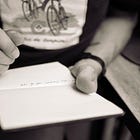Art and Mental Health Interview with Writer Leon Macfayden
"Before I started writing, I saw my depression and pain as entirely negative. Now I see it all as material - and as a chance to make a difference to others."
I have to confess that for a long time I’ve primarily read women / non-binary writers. It wasn’t ever intentional; I didn’t even notice it until an article that came out at the height of the #MeToo movement suggested among a variety of ways to support women that we read books by women and I suddenly realized that for decades that is mostly what I’ve read. And I’m still drawn to that, but part of my work in this world, and in this realm of understanding the complex relationship between art and mental health, is to allow myself to learn from a variety of different voices. So, these days, I try to make sure I’m also reading writers from many diverse backgrounds and that includes tuning in to male writers.
Here on Substack, one of my favorite male writers in the mental health space is
. He writes Policing Mental Health, openly sharing his story about PTSD from his time as a police officer and other aspects of his mental health journey.Note: Since the interview, the name of Leon’s publication has changed:
He shares on his about page:
“I became a police officer at 23 and worked in challenging inner city areas. I eventually cracked under the strain and began suffering flashbacks, depression, and anger.”
23?! Do we even remember that so many of our police, military, emergency responders are so, so young?! Leon also shares:
“I was diagnosed with Post Traumatic Stress Disorder and Schizophrenia and told I was 100% disabled forever. My life as I knew it was over.”
Spoiler alert - it’s been 20 years and Leon’s life isn’t over. In fact, he is recovered and thriving and writing and breaking down the barriers of stigma by sharing authentically about his own experience.
I’m very honored to have him here today for an interview. So let’s learn more …
I really love your unique pieces here on Substack. How did you come to writing?
I write articles for a few websites. I started a couple of years ago. I can't remember why I kept at it as I never knew I wanted to be a writer, but I remember getting some nice comments and getting paid on Medium and it hooked me.
Did you have any other creative outlets prior to becoming a writer?
When I was 10 I began learning to play the piano. I played for 8 years and reached the top grade possible. I performed in some concerts, which I found terrifying but when I finished it was like walking on air. Although I was bullied at school, music lessons were the one time everyone wanted to be my friend because I was the best by far. When I wasn't playing the piano, I was reading about composers and even attended a music school. Then I hit 18 and went to university and gave it all up. It was hard to find a piano to practice, but if I wanted it badly enough, I'd have found a way. I never played again, much to my dad's sadness.
What do you like most about writing?
Writing helps me organize my thoughts. A clear writer is a clear thinker. I've written a lot about my traumas in as much detail as I can without upsetting readers. It's helped me as much as it helps others.
My "call to writing" was solely based on using my mental health experiences to help others. It's a way for me to take something painful and horrendous and turn it into something positive. My life now has meaning from the very thing that took it away.
How do you navigate writing authentically about trauma without re-traumatizing yourself or triggering trauma in readers?
The horrific stories I write about are floating around in my head every hour of every day anyway. I live alongside them even now although they have little emotional impact anymore. So I'm writing about stuff I can't forget anyway.
As for triggering trauma in my readers I try to never go into detail about the horrors of each incident. I used to, and I'd use a trigger warning, but I think that was a mistake. I thought I needed to describe the horror to stand out as a writer because most people have no idea. Other times, I'd write something that, on reflection, was gory or brutal but I didn't notice because I'm desensitized. I hope I'm more thoughtful now. Good writing can make an impact without such shock pieces.
That makes sense. I think a lot of us are learning that, not just individually but more collectively in the worlds of art and writing - at least that is what I’ve been seeing in my work and education.
So, your mental health experiences are really the reason that you write. That’s powerful. Do your experiences ever impact your ability to write?
I write regardless of how I feel, but I use my experiences in my writing. So, if I'm struggling with anxiety, I find a way to write about it. I try to find takeaways that readers can do to help themselves and then I can implement them into my life as well. Instead of the overdone and cliched "self help guru," I feel like me and my audience are learning together and figuring it out as we go along.
What's a tip/trick/insight/habit that you discovered is helpful for you only after writing about it?
I realized writing frees me from my demons. PTSD thrives on secrecy and I kept secrets for decades. I was never traumatized by the gore - that would be too simple. It was the terrible stories behind the incidents and the connections I felt to victims that caused my biggest problems. I took the risk of writing about them and immediately felt lighter. I decided to never keep secrets again. I write about the things I feel most guilty about. I talk about the back stories as much as I can without identifying anyone and this carries into my day to day life. I will talk to anyone about anything now. If you watch documentaries about the Vietnam war, those veterans are still suffering decades later and are closed books. Their pain is stuck inside forever. I couldn't let that be me.
I think so many of us write to understand and help ourselves. And in turn, that sometimes, if we’re lucky, also helps others.
Yes, my experiences have given me an authority to write. I'm not a psychiatrist or a practicing therapist, but I have decades of personal experience and I've found (and still finding) ways to use that to connect with others in similar positions.
So, you write regardless of how you feel. Your productivity isn’t impacted by mental health?
Mental health issues have given me all the time in the world as I was medically retired at 27. So I have the luxury of doing this as much as I want, even if the rewards aren't immediate.
What has been rewarding so far?
Writing has helped me organize my thoughts and give meaning to what happened to me. Before I started writing, I saw my depression and pain as entirely negative. Now I see it all as material - and as a chance to make a difference to others.
My challenges have given me a purpose and allowed my creativity to shine through. A creativity I didn't even know I had.
How have you experienced sharing your writing? Has there been any stigma or pushback?
I've hardly ever had negative comments. I had self doubts at first because, like all new writers, I felt like I was shouting into a void. I still feel like that sometimes even as my audience has grown substantially. I guess writers all have insecurities and the positive comments and numbers are validation.
I do think there’s validation in that connection with others. But also there can be risks if we rely on those numbers. A helpful article on that here.
In what ways has creating art hindered or harmed your mental health?
Occasionally, I've suffered a slump after a particularly harrowing article, but that's fine because my unique selling point is that I'll go to the places others won't for the sake of writing. If I didn't push myself so hard I'd feel like a fraud.
In your own words, what do you think is the relationship between art and mental health?
Art in all it's forms is the closest thing I've found to the meaning of life. Anyone who has ever marvelled at a painting or listened to a Symphony will have felt that feeling. We can live without art but we can't LIVE without it.
Before we wrap up, I love to know what other writers are reading. What are a couple of books you might recommend?
The best book to improve writing skill is "On Writing Well" by William Zinsser. I also like "Smart Brevity.”
And who are a few people here on Substack that you’d recommend?
There are many great writers here. My top three would be:
- of
- of
- by
Connect with Leon on Medium: leonmacfayden and, of course, here on Substack.
If you read this far, perhaps you liked the work. The work does take work. It only continues with support, so please consider subscribing. My annual rate starts at $10 per year.







Thank you Kathryn for introducing us to Leon Macfayden's work. Leon's journey coping with PTSD is truly inspiring. It's heartening to see how writing has been a transformative tool for him, helping not only to organize his thoughts but also to turn pain into a positive force. I appreciate the mention of Coffee Times in the interview Leon. Thank you!
Thank you for sharing your experience, Leon; such a powerful and inspiring path.